- Home
- Diana Wynne Jones
Castle in the Air Page 7
Castle in the Air Read online
Page 7
“Cut his throat,” said one.
Abdullah blinked sand out of his eyes and thought he had seldom seen a more villainous crew of men. They all had scarred faces, shifty eyes, bad teeth, and unpleasant expressions. The man with the pistol was the most unpleasant of the lot. He wore a sort of earring through one side of his large hooked nose and a very bushy mustache. His head-cloth was pinned up at one side with a flashy red stone in a gold brooch.
“Where have you sprung from?” this man said. He kicked Abdullah. “Explain yourself.”
All of them, including the man who was wading out of the pool with some kind of bottle, looked at Abdullah with expressions that said his explanation had better be good. Or else.
Chapter 7
Which introduces the genie.
Abdullah blinked more sand out of his eyes and stared earnestly at the man with the pistol. The man really was the absolute image of the villainous bandit of his daydream. It must be one of those coincidences.
“I beg your pardon a hundred times, gentlemen of the desert,” he said with great politeness, “for intruding on you in this manner, but am I addressing the most noble and world-famous bandit, the matchless Kabul Aqba?”
The other villainous men around him seemed astonished. Abdullah distinctly heard one say, “How did he know that?” But the man with the pistol simply sneered. It was something his face was particularly well designed to do. “I am indeed he,” he said. “Famous, am I?”
It was one of those coincidences, Abdullah thought. Well, at least he knew where he was now. “Alas, wanderers in the wilderness,” he said, “I am, like your noble selves, one who is outcast and oppressed. I have sworn revenge on all Rashpuht. I came here expressly to join with you and add the strength of my mind and my arm to yours.”
“Did you indeed?” said Kabul Aqba. “And how did you get here? By dropping from the sky, chains and all?”
“By magic,” Abdullah said modestly. He thought it was the thing most likely to impress these people. “I did indeed drop from the sky, noblest of nomads.”
Unfortunately they did not seem impressed. Most of them laughed. Kabul Aqba, with a nod, sent two of them up the sand dune to examine Abdullah’s point of arrival. “So you can work magic?” he said. “Do these chains you wear have anything to do with that?”
“Certainly,” said Abdullah. “Such a mighty magician am I that the Sultan of Zanzib himself loaded me with chains for very fear of what I could do. Only strike these chains apart and undo these handcuffs and you will see great things.” Out of the corner of his eye he saw the two men returning, carrying the carpet between them. He hoped very much that this was a good thing to happen. “Iron, as you know, inhibits a magician in the use of magic,” he said earnestly. “Feel free to strike it off me and see a new life open before you.”
The rest of the bandits looked at him dubiously. “We haven’t got a cold chisel,” said one. “Or a mallet.”
Kabul Aqba turned to the two men with the carpet. “There was only this,” they reported. “No sign of anything to ride. No tracks.”
At this the chief bandit stroked his mustache. Abdullah found himself wondering if it ever got tangled with his nose ring. “Hmm,” he said. “Then I’ll lay odds it’s a magic carpet. I’ll have it here.” He turned sneeringly to Abdullah. “Sorry to disappoint you, magician,” he said, “but since you delivered yourself so conveniently in chains, I’m going to leave you that way and take charge of your carpet, just to prevent accidents. If you really want to join us, you can make yourself useful first.”
Somewhat to his surprise, Abdullah found he was far more angry than frightened. Perhaps it was that he had exhausted all his fear that morning in front of the Sultan. Or perhaps it was just because he ached all over. He was sore and scraped from sliding down the sand dune, and one of his ankle bands was chafing brutally. “But I have told you,” he said haughtily, “that I shall be no use to you until my chains are off.”
“It is not magic we want from you. It is knowledge,” said Kabul Aqba. He beckoned to the man who had gone wading into the pool. “Tell us what manner of thing this is,” he said, “and we may let your legs loose as a reward.”
The man who had been in the pool squatted down and held out a smoky blue bottle with a rounded belly. Abdullah levered himself to his elbows and looked at it resentfully. It seemed to be new. There was a clean new cork showing through the smoky glass of the neck, which had been sealed over with a stamped lead seal, again new-looking. It looked like a bottle of perfume that had lost its label. “It’s quite light,” said the squatting man, shaking the bottle about, “and it neither rattles nor sloshes.”
Abdullah thought of a way he could use this to get himself unchained. “It’s a genie bottle,” he said. “Know, denizens of the desert, that it could be very dangerous. Do but take these chains from me, and I will control the genie within and make sure he obeys your every wish. Otherwise I think no man should touch it.”
The man holding the bottle dropped it nervously, but Kabul Aqba only laughed and picked it up. “It looks more like something good to drink,” he said. He tossed the flask to another man. “Open it.” The man laid down his saber and got out a large knife, with which he hacked at the lead seal.
Abdullah saw his chance of getting unchained going. Worse, he was about to be exposed as a fraud. “It is really extremely dangerous, O rubies among robbers,” he protested. “Once you have broken the seal, do not on any account draw the cork.” As he spoke, the man peeled the seal away and dropped it on the sand. He began prying the cork out, while another man held the bottle steady for him. “If you must draw the cork,” Abdullah babbled, “at least tap on the bottle the correct and mystical number of times and make the genie inside swear—”
The cork came out. Pop. A thin mauvish vapor came smoking out of the neck of the flask. Abdullah hoped the thing was full of poison. But the vapor almost instantly thickened to a cloud that came rushing out of the bottle like a kettle boiling bluish mauve steam. This steam shaped itself into a face—large and angry and blue—and arms, and a wisp of body connected to the bottle, and went on rushing forth until it was easily ten feet tall.
“I made a vow!” the face howled, in a large, windy roar. “The one who lets me out shall suffer. There!” The misty arms gestured.
The two men holding the cork and the bottle seemed to wink out of existence. Cork and bottle both fell to the ground, forcing the genie to billow sideways from the neck of the bottle. From the midst of his blue vapor, two large toads came crawling and seemed to gaze around in bewilderment. The genie came slowly and vaporously upright, hovering above the bottle with his smoky arms folded and a look of utter hatred on his misty face.
By this time everyone had run away except for Abdullah and Kabul Aqba, Abdullah because he could barely move in his chains and Kabul Aqba because he was clearly unexpectedly brave. The genie glowered at the two of them.
“I am the slave of the bottle,” he said. “Much as I hate and detest the whole arrangement, I have to tell you that he who owns me is allowed one wish every day and I am forced to grant it.” And he added menacingly, “What is your wish?”
“I wish—” began Abdullah.
Kabul Aqba quickly rammed his hand across Abdullah’s mouth. “I am the one wishing,” he said. “Get that quite clear, genie!”
“I hear,” said the genie. “What wish?”
“One moment,” said Kabul Aqba. He put his face close to Abdullah’s ear. His breath smelled even worse than his hand, although neither, Abdullah had to admit, was a patch on Jamal’s dog. “Well, magician,” the bandit whispered, “you’ve proved you know what you’re talking about. Advise me what to wish and I’ll make you a free man and an honored member of my band. But if you try to make a wish yourself, I kill you. Understand?” He put the muzzle of his pistol to Abdullah’s head and let go of his mouth. “What shall I wish?”
“Well,” said Abdullah, “the wisest and kindest wish would be to
wish your two toads turned back into men.”
Kabul Aqba spared a surprised glance for the two toads. They were crawling uncertainly along the muddy edge of the pool, obviously wondering whether they could swim or not. “A waste of a wish,” he said. “Think again.”
Abdullah racked his brain for what might please a bandit chief most. “You could ask for limitless wealth, of course,” he said, “but you would then need to carry your money, so perhaps you should first wish for a team of sturdy camels. And you would need to defend this treasure. Perhaps your first wish should be for a supply of the famous weapons of the north, or—”
“But which?” demanded Kabul Aqba. “Hurry. The genie is becoming impatient.”
This was true. The genie was not exactly tapping his foot, since he had no feet to tap, but there was something about his looming, lowering blue face that suggested there would be two more toads by the pool if he had to wait much longer.
A very short burst of thought was enough to convince Abdullah that his situation, despite the chains, would be very much worse if he became a toad. “Why not wish for a feast?” he said lamely.
“That’s better!” said Kabul Aqba. He clapped Abdullah on the shoulder and sprang up jovially. “I wish for a most lavish feast,” he said.
The genie bowed, rather like a candle flame bending in a draft. “Done,” he said sourly. “And much good may it do you.” And he poured himself carefully back into his bottle again.
It was a very lavish feast. It arrived almost at once, with a dull whoomping noise, on a long table with a striped awning above it for shade, and with it arrived livened slaves to serve it. The rest of the bandits rather quickly got over their fear and came racing back to lounge on cushions and eat delicate food from golden dishes and to shout at the slaves for more, more, more! The servants were, Abdullah found when he got a chance to talk to some of them, the slaves of the Sultan of Zanzib himself, and the feast should have been the Sultan’s.
This news made Abdullah feel just a little better. He spent the feast still in chains, hitched up against a handy palm tree. Though he had not expected anything better from Kabul Aqba, it was still hard. At least Kabul Aqba remembered him from time to time and, with a lordly wave of his hand, sent a slave over with a golden dish or a jug of wine.
For there was plenty. Every so often there was another muffled whoomp and a fresh course would arrive, carried by more bewildered slaves, or there would be what looked like the pick of the Sultan’s wine cellar loaded onto a jeweled trolley, or an astonished group of musicians. Whenever Kabul Aqba sent a new slave over to Abdullah, Abdullah found that slave only too ready to answer questions.
“In truth, noble captive of a desert king,” one told him, “the Sultan was most enraged when the first and second courses so mysteriously disappeared. On the third course, which is this roast peacock that I carry, he placed a guard of mercenaries to escort us from the kitchen, but we were snatched from beside them, even at the very door of the banquet hall, and instantly found ourselves in this oasis instead.”
The Sultan, Abdullah thought, must be getting hungrier and hungrier.
Later a troupe of dancing girls appeared, snatched in the same way. That must have enraged the Sultan even more. These dancers made Abdullah melancholy. He thought of Flower-in-the-Night, who was twice as beautiful as any of them, and tears came into his eyes.
As the jollity around the table grew, the two toads sat in the shallow edge of the pond, hooting mournfully. No doubt they felt at least as bad about things as Abdullah did.
The moment night fell, the slaves, the musicians, and the dancing girls all vanished, though what was left of the food and wine stayed. The bandits by then had glutted themselves and then sated themselves again after that. Most of them fell asleep where they sat. But to Abdullah’s dismay, Kabul Aqba got up—a little unsteadily—and collected the genie bottle from under the table. He made sure it was corked. Then he staggered over to the magic carpet and lay down on it with the bottle in his hand. He fell asleep almost at once.
Abdullah sat against the palm tree in increasing anxiety. If the genie had returned the stolen slaves to the palace in Zanzib—and it seemed likely that he had—then someone was going to ask them angry questions. They would all tell the same story of being forced to serve a band of robbers, while a well-dressed young man in chains sat and watched from a palm tree. The Sultan would put two and two together. He was no fool. Even now a troop of soldiers could be setting out on fast racing camels to hunt the desert for a certain small oasis.
But that was not the greatest of Abdullah’s worries. He watched the sleeping Kabul Aqba in even greater anxiety. He was about to lose the magic carpet and, of course, an extremely useful genie with it.
Sure enough, after about half an hour Kabul Aqba rolled over on to his back and his mouth came open. As no doubt Jamal’s dog had done, as Abdullah himself must have done—but surely not so very loudly?—Kabul Aqba uttered an enormous rasping snore. The carpet quivered. Abdullah saw it clearly in the light of the rising moon rise a foot or so from the ground, where it hung and waited. Abdullah conjectured that it was busy interpreting whatever dream Kabul Aqba was having just then. What a bandit chief might dream about Abdullah had no idea, but the carpet knew. It soared into the air and began to fly.
Abdullah looked up as it glided over the palm fronds above him and had one last try at influencing it. “O most unfortunate carpet!” he called out softly. “I would have treated you so much more kindly!”
Maybe the carpet heard him. Or maybe it was an accident. But something roundish and faintly glimmering rolled off the edge of the carpet and dropped with a light thunk on the sand a few feet from Abdullah. It was the genie bottle. Abdullah reached out, as quickly as he could without too much rattling and jingling of his chains, and dragged the bottle into hiding between his back and the palm tree. Then he sat and waited for morning, feeling decidedly more hopeful.
Chapter 8
In which Abdullah’s dreams continue to come true.
The moment the sun flushed the sand dunes with white-rosy light, Abdullah wrenched the cork out of the genie’s bottle. The vapor steamed forth, became a jet, and rushed upward into the blue-mauve shape of the genie, who looked, if possible angrier than ever. “I said one wish a day!” the windy voice announced.
“Yes, well, this is a new day, O mauve magnificence, and I am your new owner,” said Abdullah. “And this wish is simple. I wish these chains of mine gone.”
“Hardly worth wasting a wish on,” the genie said contemptuously, and dwindled rapidly away inside the bottle again. Abdullah was just about to protest that though this wish might seem trivial to a genie, being without chains was important to him when he found himself able to move freely, without rattling. He looked down and found the chains had vanished.
He put the cork carefully back in the bottle and stood up. He was horribly stiff. Before he could move at all, he had to make himself think of fleet camels with soldiers on them speeding toward this oasis and then of what would happen if the sleeping bandits woke to find him standing there without his chains. That got him moving. He hobbled like an old man toward the banquet table. There, very careful not to disturb the various bandits who were asleep with their faces on the cloth, he collected food and wrapped it in a napkin. He took a flask of wine and tied it and the genie bottle to his belt with two more napkins. He took a last napkin to cover his head in case he got sunstroke—travelers had told him this was a real danger in the desert— and then he set off, as swiftly as he could limp, out of the oasis and due north.
The stiffness wore off as he walked. Walking became almost pleasant then, and for the first half of the morning Abdullah strode out with a will, thinking of Flower-in-the-Night and eating succulent meat pies and swigging from the wine flask as he walked. The second half of the morning was not so good. The sun swung overhead. The sky became glaring white, and everything shimmered. Abdullah started to wish that he had poured the wine away and
filled the flask at the muddy pond instead. Wine did nothing for thirst except make it worse. He wet the napkin with wine and laid it over the back of his neck, where it kept drying out far too quickly. By midday he thought he was dying. The desert swayed about before his eyes, and the glare hurt. He felt like a sort of human cinder.
“It seems that Fate has decreed that I live through my entire daydream in reality!” he croaked.

 Fire and Hemlock
Fire and Hemlock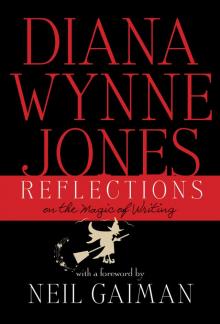 Reflections: On the Magic of Writing
Reflections: On the Magic of Writing The Game
The Game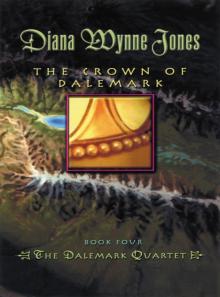 The Crown of Dalemark
The Crown of Dalemark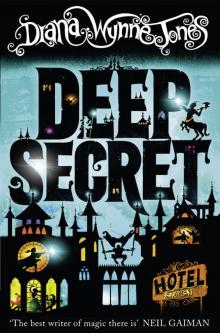 Deep Secret
Deep Secret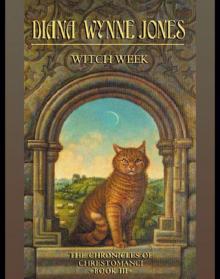 Witch Week
Witch Week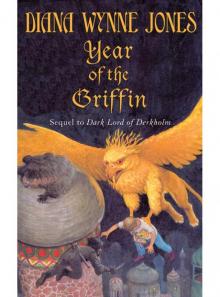 Year of the Griffin
Year of the Griffin Wild Robert
Wild Robert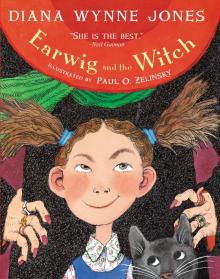 Earwig and the Witch
Earwig and the Witch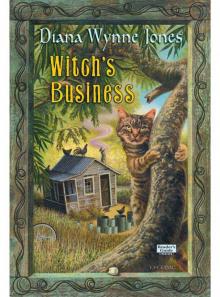 Witch's Business
Witch's Business Dogsbody
Dogsbody Caribbean Cruising
Caribbean Cruising Cart and Cwidder
Cart and Cwidder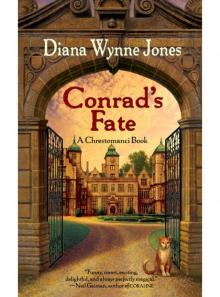 Conrad's Fate
Conrad's Fate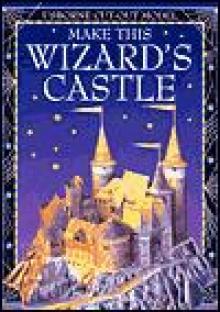 Howl's Moving Castle
Howl's Moving Castle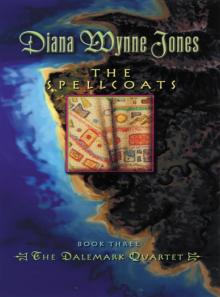 The Spellcoats
The Spellcoats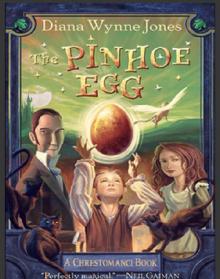 The Pinhoe Egg
The Pinhoe Egg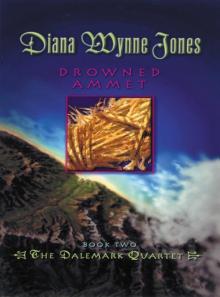 Drowned Ammet
Drowned Ammet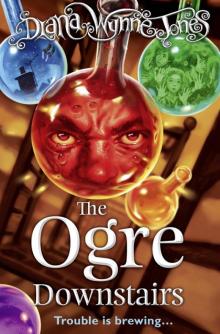 The Ogre Downstairs
The Ogre Downstairs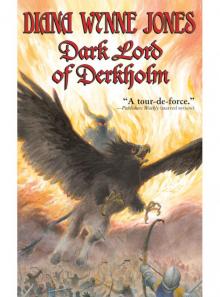 Dark Lord of Derkholm
Dark Lord of Derkholm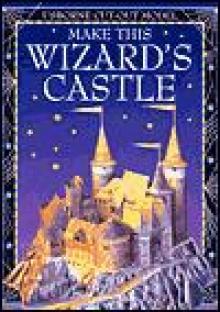 Castle in the Air
Castle in the Air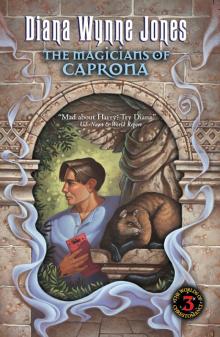 The Magicians of Caprona
The Magicians of Caprona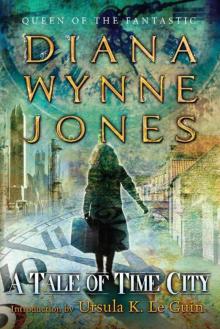 A Tale of Time City
A Tale of Time City The Lives of Christopher Chant
The Lives of Christopher Chant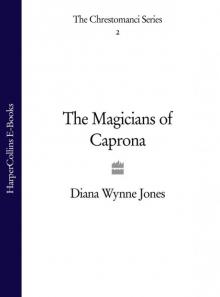 The Magicians of Caprona (UK)
The Magicians of Caprona (UK)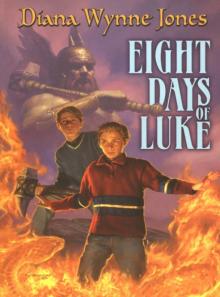 Eight Days of Luke
Eight Days of Luke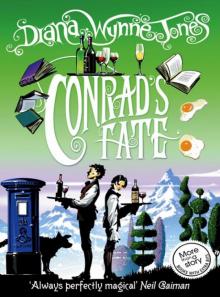 Conrad's Fate (UK)
Conrad's Fate (UK) A Sudden Wild Magic
A Sudden Wild Magic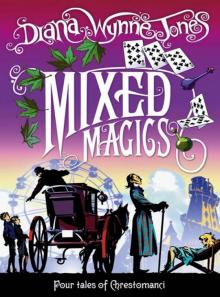 Mixed Magics (UK)
Mixed Magics (UK)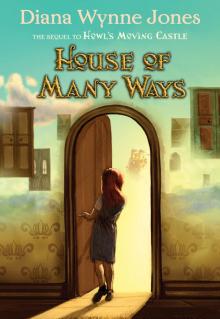 House of Many Ways
House of Many Ways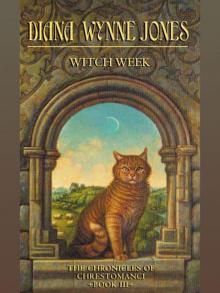 Witch Week (UK)
Witch Week (UK) The Homeward Bounders
The Homeward Bounders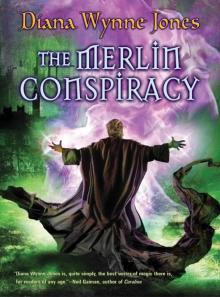 The Merlin Conspiracy
The Merlin Conspiracy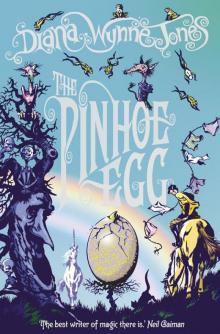 The Pinhoe Egg (UK)
The Pinhoe Egg (UK)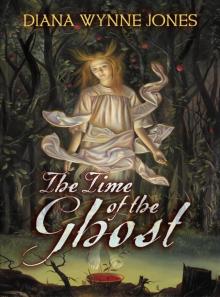 The Time of the Ghost
The Time of the Ghost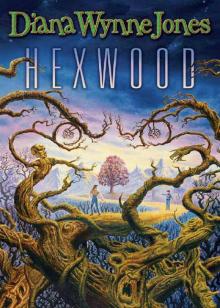 Hexwood
Hexwood Enchanted Glass
Enchanted Glass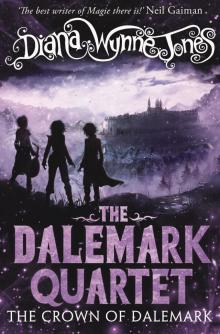 The Crown of Dalemark (UK)
The Crown of Dalemark (UK)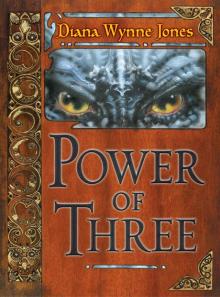 Power of Three
Power of Three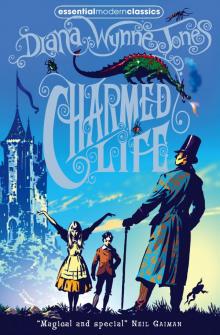 Charmed Life (UK)
Charmed Life (UK)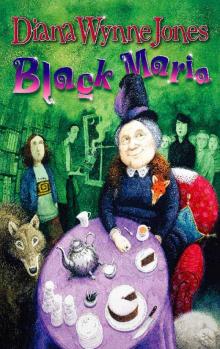 Black Maria
Black Maria The Islands of Chaldea
The Islands of Chaldea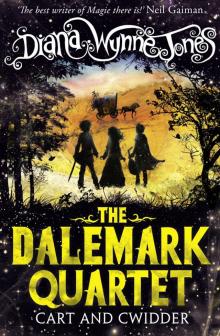 Cart and Cwidder (UK)
Cart and Cwidder (UK)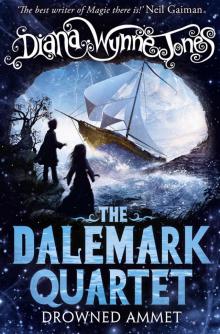 Drowned Ammet (UK)
Drowned Ammet (UK) Charmed Life
Charmed Life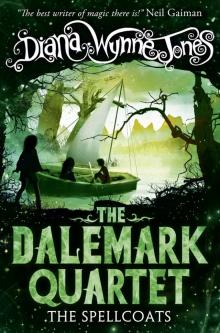 The Spellcoats (UK)
The Spellcoats (UK)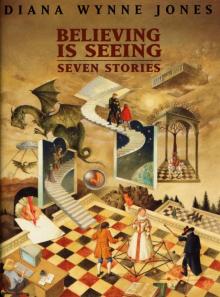 Believing Is Seeing
Believing Is Seeing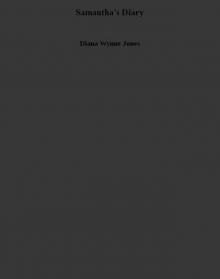 Samantha's Diary
Samantha's Diary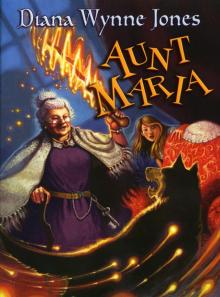 Aunt Maria
Aunt Maria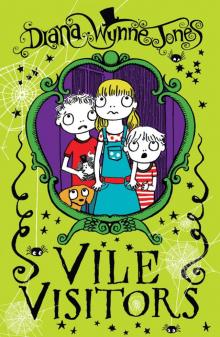 Vile Visitors
Vile Visitors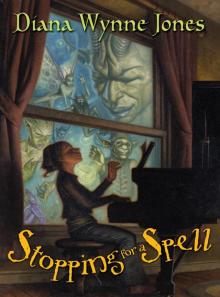 Stopping for a Spell
Stopping for a Spell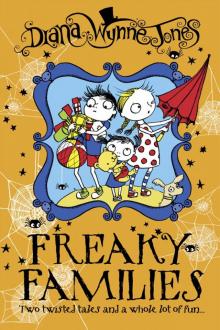 Freaky Families
Freaky Families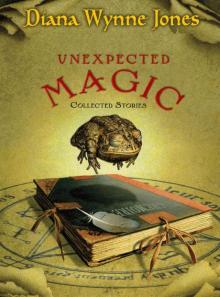 Unexpected Magic
Unexpected Magic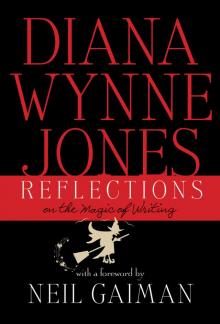 Reflections
Reflections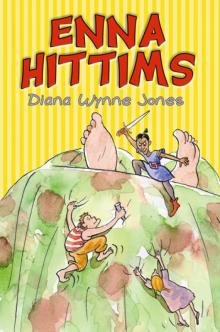 Enna Hittms
Enna Hittms Mixed Magics: Four Tales of Chrestomanci
Mixed Magics: Four Tales of Chrestomanci